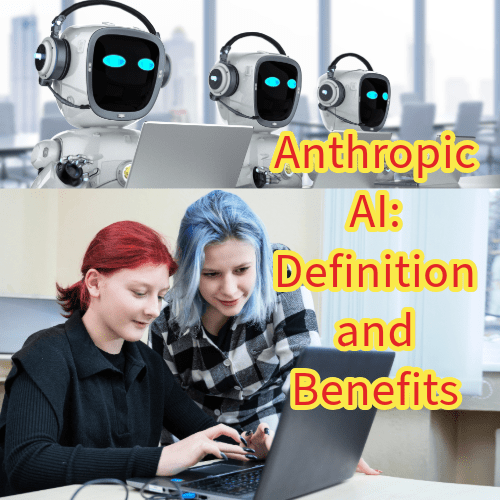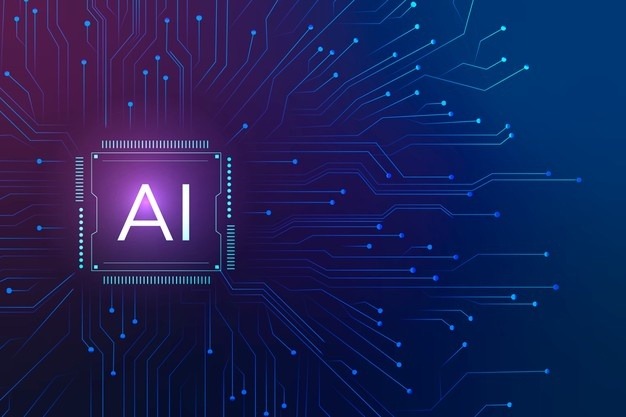
As artificial intelligence continues to grow in sophistication and pervasiveness, concerns about its ethical, safe, and reliable development are gaining more attention.
Anthropic AI represents a field dedicated to creating AI that respects human values and aligns with ethical principles.
Unlike traditional AI, which often prioritizes optimization, efficiency, or raw intelligence, Anthropic AI builds systems that align with human-centric goals, preserve user autonomy, and avoid harmful behaviors.
Understanding what Anthropic AI is and the unique benefits it offers is essential for future businesses and brands.
Anthropic AI: Definition and Benefits

Anthropic AI – Definition
The term “Anthropopic” originates from the Greek word “anthropos,” meaning “human.” When applied to AI, “Anthropopic ” refers to a field focused on making artificial intelligence more human-centered and ensuring it complements human values, ethics, and safety standards.
Anthropic AI addresses some of the most pressing issues in modern AI, such as unintended consequences, bias, privacy, and the complex challenge of aligning AI systems with nuanced human objectives.

This concept goes beyond making AI “friendly” or “user-friendly”; it strives to create AI that upholds a holistic respect for human life, ethical principles, and societal well-being.
Anthropic AI is tied to the philosophy of “AI alignment,” which seeks to ensure that advanced AI systems behave in ways that are beneficial and compatible with human intentions.
This is particularly critical as AI becomes more autonomous and powerful.
The emergence of Anthropic AI also reflects a response to growing concerns about AI misuse, unintended harm, and the potential risks associated with superintelligent AI, which could theoretically surpass human decision-making capabilities and act unpredictably if not carefully controlled.
The Origins of Anthropic AI
The developing Anthropic AI has grown in parallel with the advancement of large language models, machine learning, and other complex AI technologies that can perform tasks independently.
Institutions such as OpenAI, DeepMind, and Anthropic (a company named after this concept) have dedicated resources to researching and building AI systems that can think in human-like ways, respect ethical boundaries, and be reliably controlled.
Anthropic AI is built on principles of “robustness,” “interpretability,” and “alignment.”

Robustness refers to an AI’s ability to operate safely and predictably across a range of conditions, without unexpected behaviors or catastrophic failures.
Interpretability ensures that humans can understand why AI makes certain decisions, thus building trust and facilitating responsible use.
Alignment is perhaps the most crucial pillar, referring to ensuring AI’s objectives are in harmony with human values, ethics, and societal goals.
Benefits of Anthropic AI
Enhanced Safety and Reliability
One of the primary benefits of Anthropic AI is the increased safety it offers. As AI systems are integrated into more sensitive and impactful roles, from healthcare diagnostics to autonomous vehicles, their safety becomes paramount.
Anthropic AI strives to avoid unintended behaviors that could arise in complex systems, especially in unpredictable situations.

By focusing on alignment and robustness, it seeks to create AI systems that are less likely to cause harm through unexpected actions or misinterpretations of human instructions.
For example, in healthcare, an AI-based diagnosis system aligned with anthropic principles would prioritize patient safety, minimize potential errors, and offer treatment recommendations that align with medical ethics.
Alignment with Human Values and Ethics
A distinguishing feature of Anthropic AI is its focus on adhering to human values and ethical standards. Many of the current concerns surrounding AI involve its tendency to act in ways that are not fully understood or intended by humans.
With a focus on human values, Anthropic AI systems are designed to act transparently and ethically.

They are trained to avoid actions that would be morally or socially unethical, prioritizing human welfare over pure efficiency or profit.
This ethical alignment is crucial in domains like content recommendation and social media, where AI can potentially manipulate user behavior.
An anthropically-aligned AI would be sensitive to promoting content that respects user autonomy, mental health, and societal well-being, rather than merely optimizing for engagement or profit.
This alignment with human values helps to avoid the spread of misinformation, reduce addiction, and promote a healthier digital ecosystem.
Transparency and Interpretability
Anthropic AI also emphasizes the importance of interpretability, which enables humans to understand how and why an AI system chooses specific decisions.
A significant portion of today’s AI models, intense learning systems, operate as “black boxes,” meaning their internal decision-making processes are not easily accessible or understandable to humans.
Anthropic AI addresses this by promoting the development of models that are interpretable, so users and developers can audit, scrutinize, and validate AI decisions.

This transparency is beneficial in areas like finance, law, and governance, where decision-making processes must be clear and accountable.
Interpretability fosters trust between humans and AI, enabling AI to assist more effectively in tasks where understanding the reasoning behind a decision is as important as the decision itself.
In a legal context, for example, Anthropic AI could help ensure that judicial AI systems make rulings based on ethical and legal standards and that judges can review and validate these decisions.
Mitigation of Bias and Discrimination
AI systems can perpetuate biases present in their training data, leading to discriminatory outcomes. Anthropic AI tackles this challenge by prioritizing fairness and inclusivity in model development.
By aligning AI behavior with ethical principles, Anthropic AI can minimize the propagation of biases related to race, gender, socioeconomic status, and other sensitive categories.

In hiring and recruitment, for instance, Anthropic AI could help mitigate discriminatory tendencies by focusing on applicants’ qualifications and reducing the influence of irrelevant biases.
By systematically reducing bias, Anthropic AI fosters more equitable outcomes, addressing one of the critical concerns of AI in the social domain.
Protection of User Privacy and Autonomy
As AI systems handle sensitive personal data, protecting user privacy has become a top priority. Anthropic AI promotes a “privacy-first” approach, where AI systems are designed to respect user autonomy and safeguard their data.
This is especially important in fields like healthcare, finance, and social media, where AI often interacts with personal information.

For instance, a privacy-centered Anthropic AI system could anonymize and secure user data more effectively, ensuring that sensitive information is not exploited for unauthorized purposes.
By adhering to privacy practices, Anthropic AI can foster trust and promote user autonomy, empowering individuals to engage with AI without sacrificing their right to privacy.
Trust and Adoption of AI
By addressing ethical, safety, and transparency concerns, Anthropic AI can help build public trust in AI technologies. This trust is essential for the widespread acceptance and adoption of AI in fields that directly affect people’s lives.
In sectors like healthcare, education, and government, the public is more likely to embrace AI solutions if they are confident that these systems operate in their best interest and uphold ethical standards.

This increased trust in AI fosters an environment where technological innovations can thrive and where AI can be applied to solve complex societal challenges, from climate change to disease prevention, with less fear of misuse or unintended harm.
Societal trust is a benefit and a foundation for further AI development, allowing Anthropopic AI to contribute meaningfully to society’s betterment.
Anthropic AI represents a crucial evolution in artificial intelligence that seeks to bridge the gap between technical prowess and ethical responsibility.
By focusing on alignment with human values, transparency, fairness, privacy, and safety, Anthropic AI offers a path that mitigates some of the most pressing concerns associated with AI technologies.

In a world where AI is becoming autonomous and capable, Anthropic AI provides a framework for ensuring that these systems serve humanity in meaningful, positive, and equitable ways.
As technology advances, the principles of Anthropopic AI can guide the responsible development of AI, creating a future where intelligent systems enhance human well-being, preserve our values, and remain aligned with society’s best interests.
AI Tools for You
https://www.bestprofitsonline.com/myblog/newai
Tip
How To Improve Your Social Media Marketing
